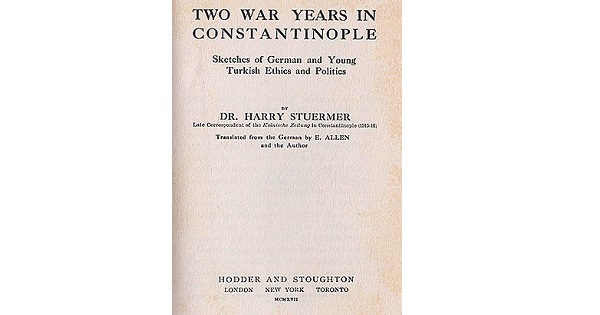
TWO WAR YEARS IN CONSTANTINOPLE
SKETCHES OF GERMAN AND YOUNG TURKISH ETHICS AND POLITICS
By Harry Stürmer: Late Correspondent of the Kölnische Zeitung in Constantinople (1915-16)
Hodder & Stoughton, London, 1917.
Translated from the German by E. Allen and the Author
Harry Stürmer was sent to Turkey as a correspondent for the German newspaper the Kölnische Zeitung and reported on events in Ottoman Turkey during the war. He was there between 1915-1916 before leaving and arriving in Switzerland in 1917 where he published his memoirs relating to his time in Turkey. In these memoirs, Stürmer writes openly about the persecution of Armenians and also Greeks and Germany's responsibility in the Young Turk atrocities during the war.
Preface
While the author of this work was waiting on the frontier of Switzerland for final permission from the German authorities to enter that country, Germany committed her second great crime, her first having completely missed its mark. She had begun to realise that she was beaten in the great conflict which she had so wantonly provoked with her characteristic over-confidence in the power of her own militarism and disdainful undervaluation of the morale and general capacities of her enemies. In final renunciation of any last remnants of humanity in her methods, she was now making a dying effort to help her already lost cause by a ruthless extension of her policy of piracy at sea and a gratification of all her brutal instincts in complete violation of the rights of neutral countries.
It is therefore with all the more inward conviction, with all the more urgent moral persuasion, that the author makes use of the rare opportunity offered him by residence in Switzerland to range himself boldly on the side of truth and show that there are still Germans who find it impossible to condone even tacitly the moral transgression and political stupidity of their own and an allied Government. That is the sole purpose of this publication.
Regardless of the consequences, he holds it to be his duty and his privilege, just because he is a German, to make a frank statement, from the point of view of human civilisation, of what have become his convictions from personal observations made in the course of six months of actual warfare and practically two years of subsequent journalistic activity. He spent the time from Spring 1915 to Christmas 1916 in Turkey, and will of course only deal with what he knows from personal observation. The following essays are of the nature merely of sketches and make no claim whatever to completeness.
With regard to purely German politics and ethics, therefore, the author will confine himself to a few indications and impressions of a personal kind, but he cannot forget the role Germany has played in Turkey as an ally of the present Young Turkish Government, nor can he ignore Germany's responsibility for the atrocities committed by them. The author publishes his impressions with a perfectly clear conscience, secure in the conviction that as the representative of a German paper he never once wrote a single word in favour of this criminal war, and that during his stay of more than twenty months in Turkey he never concealed his true opinions as soon as he had definitely made up his mind what these were.
On the contrary, he was rather dangerously candid and frank in speaking to anyone who wanted to listen to him — so much so, that it is almost a miracle that he ever reached a neutral country. After the war he will be in a position to appeal to the testimony of dozens of people of high standing in all walks of life that in both thought and action a deep cleft has always divided him from his fellow-journalists, and that he has ever ardently longed for the moment when he might, freely and without fear of consequences, do his bit towards the enlightenment of the civilised world.
May these lines, written in all sincerity and hereby submitted to the tribunal of public opinion, free the author at last from the burden of silent reproach heaped on him by a mutilated, outraged, languishing humanity, of being a German among thousands of Germans who desired this war.
Stürmer wrote:
I should like to say a word here about these Greek persecutions in Thrace and Western Anatolia that have become notorious throughout the whole of Europe. They took place just before the outbreak of war, and cost thousands of peaceful Greeks—men, women, and children—their lives, and reduced to ashes dozens of flourishing villages and towns. At the time of the murder of Sarajevo, I happened to be staying in the vilajet of Aidin, in Smyrna and the Hinterland, and saw with my own eyes such shameful deeds as must infuriate anyone against the Turkish Government that aids and abets such barbarity—from old women being driven along by a dozen Mohadjirs and dissipated soldiers to the smoking ruins of Phocæa.1
So it comes about that the Turkish idea of penetrating and 'cleaning-up' Anatolia finds practical expression on the one hand in exterminating and robbing the Christian population, while on the other it inclines to efforts which in time may work out to be a real blessing. The common principle underlying both is Nationalism.2
1. Stürmer, Henry, Two War Years in Constantinople. Hodder & Stoughton, London, 1917, p. 169.
2. Ibid, p. 171.
Further Reading:
Otto Liman von Sanders (1855-1929)
15 Mar 1919: First Hun Held for Atrocities, The Evening Independent
Deutschland über Allah! By John F. Williams
Atatürk in the Nazi Imagination



